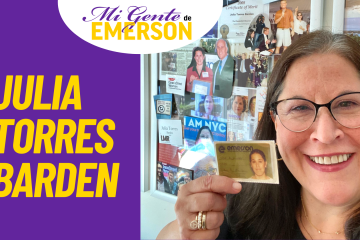A version of this blog was shared through Tiffany Amoakohene’s blog on Medium. Click here to view the original version.
My manager is an engineer with a systematic mindset. Whenever he meets with a student, he ends every conversation with the same advice. “Focus and excel.” In other words, don’t do too many things at once. Master one thing at a time, and go from there.
I’ll admit that following this pragmatic mantra from time to time has helped me tackle and achieve new goals. That being said, I will always belong to the “Jack and Jill of All Trades” club.
Sticking with one thing and excelling at it has never been my strong suit. I’ve always hopped from one thing to the next — work, play, relationships — you name it. I’m the type of person who likes to study multiple languages and simultaneously manage a range of freelance projects while teaching myself how to code. I haven’t always been successful at every endeavor, but even when I’ve failed, at least I’ve had fun trying.
Although some businesses and organizations continue to employ the conventional career trajectory where you start with an entry-level position and climb a well-defined ladder, the traditional career path is becoming obsolete. Changing jobs after two or three years instead of staying at the same one for decades is no longer uncommon or considered career suicide. The rise of automation and technology has changed the career landscape, and we’re living in a new age of gig economies and startups. More people are carving out creative and entrepreneurial career paths than ever before.
I developed the Jack and Jill mindset during my undergraduate college days. Although I dreamed about writing a bestseller (and still do), I expanded my writing repertoire by learning several styles. The mix of creative, technical, and journalistic writing skills I acquired, combined with my ability to tell compelling and impactful human interest stories, helped me branch out from administrative work during my early career. I was able to enter the field of marketing and communications, and eventually grant writing.
Knowing how to do a variety of different things will enable you to diversify your skillset, weather the storm of volatile economies, and teach you how to think outside the box. Having a varied career path will give you a wealth of job experiences that will keep you on your toes and increase your marketability. It will also give you the confidence and freedom to walk away from bad situations without fear and the courage to take risks. Even as you age with the changing job market, you’ll always be able to land on your feet.
The U.S. education system continues to lag behind when it comes to adequately preparing students — specifically high school and college graduates — for the ever changing job market, but that doesn’t mean you can’t prepare for it on your own.

Becoming a Jack and Jill of All Trades, doesn’t have to involve making a lot of money. Booker T. Washington said, “If you want to lift yourself up, lift up someone else.” I’ve always believed that aiding others in their success will add to my own. Helping others through acts of service has always been a huge part of my personal brand, and the rewards are endless. Volunteering has exposed me to a range of industries and networking opportunities, and I’ve developed new skills along the way. For example, I was able to take on leadership roles as a volunteer coordinator and project manager, and I increased my administrative skills by working with databases.
In the past, I worked with men and women with minimal education and limited employment histories during my previous role in workforce development. My clients often felt discouraged at the beginning of the resume building process. However, I reminded them that volunteer work is a good starting point that can highlight transferable, soft and hard skills, such as leadership, communication, and time management, as well as the ability to prioritize, think critically, and solve problems.
We never know what life is going to throw at us, so it’s important to be prepared. Nine years ago, I had to take a step back from the high-octane work schedule I had due to family caretaking responsibilities. I fell back on the thing that I loved — teaching English language learners. I started as a volunteer, but realized that teaching part-time would give me more flexibility. I earned a TEFL certificate and began teaching English to adults in my local area. When my personal life got back on track, I was able to use my new teaching skills overseas. In addition to saving money and having the adventure of a lifetime, my overseas teaching experience made my resume stand out and made me more attractive to hiring managers.
When I taught high school, I learned that my students were pros at texting on their phones, but when it came to typing on the computer during in-class exercises, they lacked speed and didn’t get much done. I was grateful for the typing skills I acquired during my senior year of high school even though I initially thought the course would be a waste of time. Little did I know that the ability to touch type would help me complete schoolwork much faster during college, as well as make me a future asset in the workplace.
My typing skills enabled me to multi-task and use my time efficiently. I didn’t have to struggle to focus on the work because I wasn’t worrying about where my fingers needed to go. Touch typing helped me land a few temp jobs during college and has remained beneficial to my administrative skillset as I’ve worked through temp agencies off-and-on throughout the years.
As a writer, the ability to touch type helps me take notes during interviews and type up notes that I’ve written by hand or recorded. Typing with speed and accuracy while listening to audio has also afforded me the opportunity to do free-lance transcription work on the side.
You can become a Jack and Jill of All Trades at any point in your career. Here are some key strategies to help you get started.

Research the Job Market
Investigate the current job market to find out which jobs are in demand, which ones are on the future horizon, and which jobs are declining. It’s important to be aware of the big picture before you invest money or time into education and training. Once you determine a few fields of interest, find out the skills, knowledge, and credentials employers are seeking.
In addition to utilizing social media platforms like LinkedIn, there are numerous ways to stay current on industry news and trends. This includes reading web journals, blogs, e-newsletters, and other industry publications. You should also consider joining a professional association related to your industry, attending conferences, and staying abreast of industry news and information from leading experts by listening to podcasts.
Develop a Learning Mentality
The job market is changing rapidly, and you don’t want to get left behind. You should constantly develop and broaden your skillset. If you can’t afford to get a Master’s degree, consider investing in continuing education programs that are offered at colleges and universities or through non-profit organizations.
Find out if your current employer offers tuition reimbursement and funding for professional development. LinkedIn Learning is one example of a company-sponsored resource that you can use at any time, even from the comfort of your own home. This online educational platform helps you develop business, technology-related, and creative skills through course videos. If money is still an issue, you’d be amazed what you can find for free from something as simple as watching a tutorial on YouTube.
Meet with a Career Counselor
Most colleges and universities offer career services. If you’re a college graduate, tap into your alumni network by meeting with a career counselor. They offer up-to-date resume and cover letter expertise, help you determine your strengths, and provide guidance about networking opportunities with other alumni in your specific field of interest. There are also public agencies called One-Stop Career Centers that offer career counseling services to adults with a range of education and employment experiences at the state and local level in your community.
Consider Working with a Temp Agency
Working with a temporary employment agency is a great way to explore new career interests. They can help you increase your administrative and technical skills in addition to providing career development resources. Although temp agencies generally place job seekers in administrative roles, you can focus on a specific industry of interest. Once you’re able to get your foot in the door, you can find a path to your dream job. Sometimes it takes time to find an agency with the right fit, but if you do your research and put yourself out there, you have the potential to be placed in a dynamic assignment that meets your goals.
We are living in trying and uncertain economic times, but we will eventually bounce back. As we continue to confront the unprecedented public health crisis caused by COVID-19, it’s important to exercise patience, creativity, and look for opportunities. It’s also a great time to learn new skills and improve old ones by becoming a Jack and Jill of all Trades.

